初中易混动词及词组汇编
初中易混动词及词组
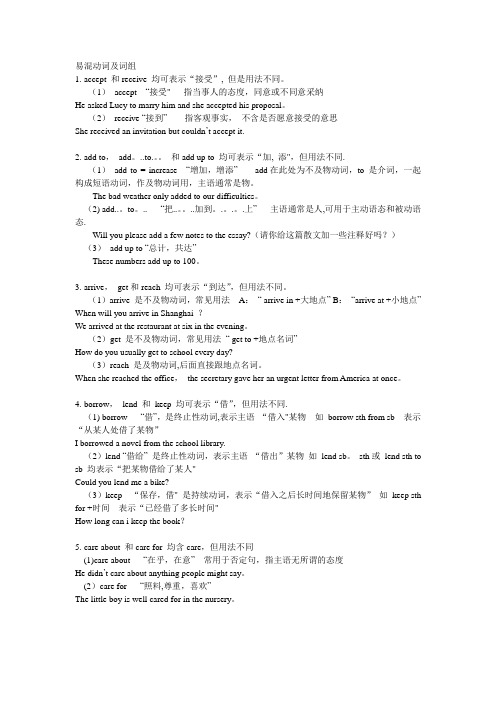
易混动词及词组1.accept 和receive 均可表示“接受”, 但是用法不同。
(1)accept “接受" 指当事人的态度,同意或不同意采纳He asked Lucy to marry him and she accepted his proposal。
(2)receive “接到”指客观事实,不含是否愿意接受的意思She received an invitation but couldn’t accept it.2.add to,add。
..to.。
和add up to 均可表示“加, 添",但用法不同.(1)add to = increase “增加,增添”add在此处为不及物动词,to 是介词,一起构成短语动词,作及物动词用,主语通常是物。
The bad weather only added to our difficulties。
(2) add..。
to。
.. “把..。
..加到。
.。
.。
.上”主语通常是人,可用于主动语态和被动语态.Will you please add a few notes to the essay?(请你给这篇散文加一些注释好吗?)(3)add up to “总计,共达”These numbers add up to 100。
3.arrive,get和reach 均可表示“到达”,但用法不同。
(1)arrive 是不及物动词,常见用法A:“ arrive in +大地点” B:“arrive at +小地点”When will you arrive in Shanghai ?We arrived at the restaurant at six in the evening。
(2)get 是不及物动词,常见用法“ get to +地点名词”How do you usually get to school every day?(3)reach 是及物动词,后面直接跟地点名词。
中考易混动词英语

中考易混动词(英语)1.几个“花费":spend, take, pay, cost(1) spend多用人作主语,后接金钱或时间。
spend.. on sth/ (in)doing sth(2) take常用于"It takes sb some time to do sth"句型中。
(3) pay常与for连用,表"付给... .款"。
(4) cost常用物作主语表“价值或花费多少钱”。
2.几个“看":look, see, watch, read, findlook看,表动作,look at。
see看见,表结果;也可说看电影"see a film"。
watch观看比赛、演出、电视等。
read读书看报等文字材料。
3.几个与“看”有关的词或词组:look for, find, find out, look after, take care of, look over, look forward to.look for寻找,表过程。
find发现,找到,表结果。
find out 找出,查明。
look after, take care of均表示“照看,照顾”。
look over检查、翻阅等。
look forward to盼望... ,期待....4.几个“说":say, speak, talk, tell(1)say用作及物动词或不及物动词。
用作及物动词时侧重说的内容;say用作不及物动词时,不涉及所说的内容。
(2)say之后通常跟直接引语、间接引语或宾语从句(2) speak常指能说某种语言,打电话时常用它表示说话,也有“演讲”的意思,不强调说话的内容(3)talk用作不及物动词,作“说话”讲时与speak可以互换使用。
作“交谈”讲时,通常与介词to / with连用。
(4)talk用作名词时,可以与动词have-起构成短语"have a talk with",意思是.和....谈一谈”。
动词短语及常见易混动词

三个提供 provide,supply,offer
1.provide提供,给予。含有“免费供给”的意味。 2.supply 供给,供应。通常指定期供应,强调替代或补 充所需物品。 3.offer提出,提供。强调“主动提供”,别人提供的可接 受也可拒绝 的物品,如帮助或服务。
四个花钱 cost,pay, spend,take
3.spend主语是人,常用sb.+spend(s)+ sth./(in)doing sth.结构。
时间/金钱on
I spend two hours playing football. He spends three hours on his homework. 4.take 主语是it(形式主语)It takes +sb.+时间/金钱 +to do sth.结构。 It takes me two days to do my homework.
三个听 listen,hear,sound
1.listen(注意地)听。不及物动词,常用 “listen to+名 词”结构,强调 听的过程。listen to music听音乐 2.hear听见,听到。及物动词,强调听的结果。 3.sound听起来。系动词,后接形容词,强调听的效果。 sound也可以加 介词like, 表示“听起来像”。 Sounds good/great!
四个花钱 cost,pay, spend,take
1.cost 主语是物,常用sth.+cost(s)+sb.+ 金钱结构。 The book costs me ten yuan. 2.pay 主语是人,常用sb.+pay(s)+ 金钱+for sth.结 构。 You should pay ten yuan for this book.
中考常考的易混动词短语总结
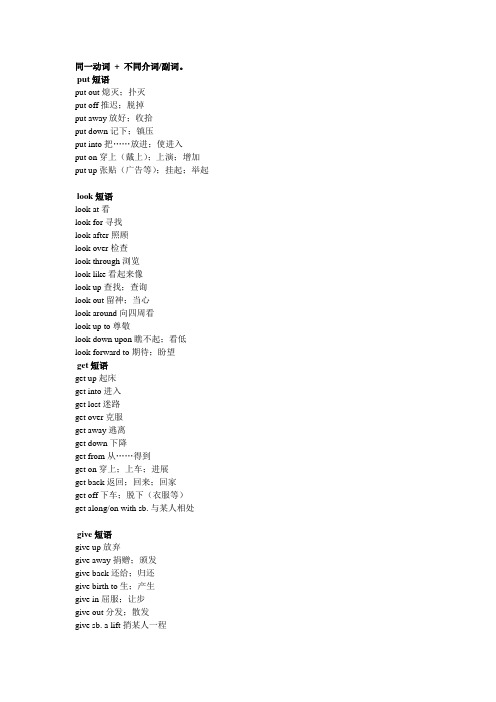
同一动词+ 不同介词/副词。
put短语put out 熄灭;扑灭put off 推迟;脱掉put away 放好;收拾put down 记下;镇压put into 把……放进;使进入put on 穿上(戴上);上演;增加put up 张贴(广告等);挂起;举起look短语look at 看look for 寻找look after 照顾look over 检查look through 浏览look like 看起来像look up 查找;查询look out 留神;当心look around 向四周看look up to 尊敬look down upon 瞧不起;看低look forward to 期待;盼望get短语get up 起床get into 进入get lost 迷路get over 克服get away 逃离get down 下降get from 从……得到get on 穿上;上车;进展get back 返回;回来;回家get off 下车;脱下(衣服等)get along/on with sb. 与某人相处give短语give up 放弃give away 捐赠;颁发give back 还给;归还give birth to 生;产生give in 屈服;让步give out 分发;散发give sb. a lift 捎某人一程take短语take away 拿走take out 取出take on 呈现;雇佣take over 接收;接管take down 记下;取下take after (外貌或行为)像take in 吸入;吞入(体内)take off 脱下(衣服等);起飞take up 从事(工作、兴趣爱好等);着手处理take part in 参加……;参与……take care of 照顾,照料(=look after)take pride in 感到自豪(=be proud of)turn短语turn on 打开turn off 关掉turn out 结果是turn up 调高(声音)turn over 翻身;翻转turn down 调低(声音)turn around 转身;调头go短语go on 继续go away 走开go back 回去go out 出去;熄灭go along... 沿着……走go over 仔细检查;复习go through 浏览;翻阅;通过come短语come from 来自come into 进入come in 进入;进来come out 出来;出版come up 发生;提到come down 下落;下降come on 来吧;赶快;加油come back 回来;想起来come over 顺便来访;过来come across (偶然)遇见(或发现)come along 一道去;进行;进展come true (希望等)实现;达到come up with 追上;赶上;想出(主意);提出fall短语fall behind 落后fall asleep 入睡fall ill 患病;病倒fall down 倒下;滑倒fall into 掉进……里fall off 从……掉下来fall in love with 爱上cut短语cut in 插嘴cut up 切碎cut down 削减;砍倒cut off 切断;中断call短语call off 取消call on 号召;拜访call up 给......打电话call for 要求;需要pick短语pick up 捡起;接载pick out 挑选;取出不同动词+ 同一介词/副词up短语eat up 吃光clean up 打扫drink up 喝光get up 起床give up 放弃make up 组成hurry up 赶快show up 出现think up 想出end up 结束take up 开始从事ring up 打电话fix up 修理;修补hang up 挂断电话bring up 教育;培养cheer up 使……开心grow up 成长;长大look up 查阅;向上看mix up 混合在一起put up 张贴;建造;举起set up 搭建;建立;设立out短语put out 扑灭sell out 卖光take out 取出work out 解决blow out 吹灭point out 指出get out 出去;离开go out 出去;熄灭hand out 分发;发放hang out 闲荡;闲逛run out 用尽;耗尽check out 查明;结账clear out 清理;丢掉set out 出发;启程keep out 不让……进入bring out 使显现;使表现出come out 出版;发表;结果是cut out 删除;删去;切断find out 查明;发现;了解try out 参加……选拔;试用clean out 清除;把……打扫干净break out (战争、火灾等)突然发生;爆发 away短语go away 走开take away 拿走get away 逃离throw away 扔掉run away 逃跑;跑掉give away 赠送;分发put away 把……收起来;整理on短语put on 穿上turn on 打开fight on 坚持pass on 传递keep on 继续(进行)try on 试穿;试试看work on 从事;忙于depend on 依赖;依靠come on 来吧;赶快;加油hold on 等一等(别挂电话)down短语cut down 砍倒fall down 倒下sit down 坐下break down 发生故障calm down 保持冷静put down 记下;放下let...down 使……失望或沮丧turn down 把……调小;关小write down 写下;记下;放下;镇压in短语arrive in 到达call in 拜访believe in 信任;信赖hand in 交上;提交;呈送join in 参加(=take part in)take in 吸入;吞入;欺骗take part in 参加……;参与……take pride in 对……感到自豪(=be proud of) off短语cut off 切除turn off 关掉go off 响;离开keep off 勿踏;勿踩take off 脱下;起飞put off 推迟;拖延clean...off 把……擦掉show off 炫耀;卖弄pay off 付清(欠款等)run off 跑掉;迅速离开break off 突然中止;中断set off 动身;起程;使爆发get off 脱下(衣服等);下车about短语think about 考虑care about 关心;在意talk about 谈论;讨论;议论worry about 担心;烦恼back短语get back 回来give back 归还;送回pay back 偿还(借款等)talk back 回嘴;顶嘴come back 回来;想起来bring back 恢复;使想起;归还call(sb.) back(给某人)回电话for短语wait for 等候;等待ask for 要;要求;请求thanks for 为……而感谢prepare for 为……做准备care for 关心;关怀;照顾pay for 付……账;付买……的钱from短语come from 来自hear from 收到……的来信learn...from... 向……学习……prevent from 妨碍;阻止;制止separate...from... 从……分开keep/stay...away from 避免接近;远离 into短语fall into 落入;陷入knock into 与……相撞turn...into 变成……divide into... 把……分成change into 转换成;把……变成get into 进入;陷入;习惯于look into 向……里面看;调查of短语hear of 听说think of 思考;考虑take care of 照顾;照看over短语fall over 绊倒look over 检查come over 顺便来访get over 克服;使(渡过)go over 仔细检查;复习to短语belong to 属于listen to... 听……stick to 坚持;固守talk to... 跟……说add...to... 把……加到……上lead to 导致;通向lend...to... 借……给……prefer...to... 喜爱……更甚于……help oneself to 随便吃点......hold on to 继续;坚持;保持pay attention to 对……注意;留心with短语deal with 处理;应付begin with 以……开始connect with 与……相连provide...with 给……提供……agree with 赞同;持相同意见compare...with... 把……与……作比较;把……与……作对比catch up with 赶上fall in love with 爱上get along/on with 与……相处make friends with 与……交友。
初中英语2024届中考复习常考易混单词和短语
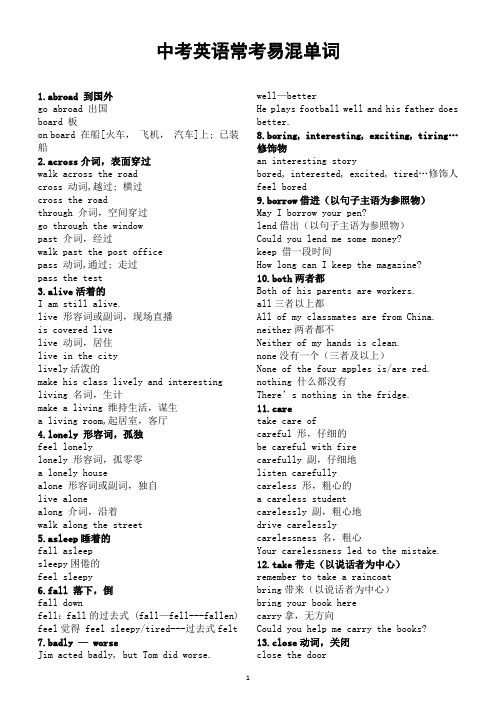
中考英语常考易混单词1.abroad 到国外go abroad 出国board 板on board 在船[火车,飞机,汽车]上; 已装船2.across介词,表面穿过walk across the roadcross 动词,越过; 横过cross the roadthrough 介词,空间穿过go through the windowpast 介词,经过walk past the post officepass 动词,通过; 走过pass the test3.alive活着的I am still alive.live 形容词或副词,现场直播is covered livelive 动词,居住live in the citylively活泼的make his class lively and interesting living 名词,生计make a living 维持生活,谋生a living room,起居室,客厅4.lonely 形容词,孤独feel lonelylonely 形容词,孤零零a lonely housealone 形容词或副词,独自live alonealong 介词,沿着walk along the street5.asleep睡着的fall asleepsleepy困倦的feel sleepy6.fall 落下,倒fall downfell:fall的过去式 (fall—fell---fallen) feel觉得 feel sleepy/tired---过去式felt 7.badly — worseJim acted badly, but Tom did worse. well—betterHe plays football well and his father does better.8.boring, interesting, exciting, tiring…修饰物an interesting storybored, interested, excited, tired…修饰人feel bored9.borrow借进(以句子主语为参照物)May I borrow your pen?lend借出(以句子主语为参照物)Could you lend me some money?keep 借一段时间How long can I keep the magazine?10.both两者都Both of his parents are workers.all三者以上都All of my classmates are from China. neither两者都不Neither of my hands is clean.none没有一个(三者及以上)None of the four apples is/are red. nothing 什么都没有There’s nothi ng in the fridge.11.caretake care ofcareful 形,仔细的be careful with firecarefully 副,仔细地listen carefullycareless 形,粗心的a careless studentcarelessly 副,粗心地drive carelesslycarelessness 名,粗心Your carelessness led to the mistake. 12.take带走(以说话者为中心)remember to take a raincoatbring带来(以说话者为中心)bring your book herecarry拿,无方向Could you help me carry the books?13.close动词,关闭close the doorclose 形容词,亲密的my closest friendclosed形,关着的keep the door closed14.closely副,密切地work closely with us15.brave形,勇敢的He is brave enough to save the old man. courage 名,勇气have the courage to tell him the bad news bravely 副,勇敢地face the difficulties bravely16.dead形容词,死的have been deaddie动,死亡die of hungerdeath名,死亡the death of his pet makes him so sad. 17.especially副,尤其He is good at all subjects, especially maths.specially副,专门The pen is specially designed for the boy. special形,特殊的a special day18.except除了All the students except Tom will go for a school trip.expect期待You are expected to bring it back when you return.19.excited形,激动的,修饰人feel excitedexciting形,激动人心的,修饰物an exciting filmexcitedly 副词,修饰动画shouted excitedlyexcitement名词shout with excitement20.a little一些,修饰不可数名词a little moneya few一些,修饰可数名词a few treeslittle几乎没有,修饰不可数名词There’s little water in the glass, is it? few几乎没有,修饰可数名词so few students21.form 形成form a good reading habitfrom 从……22.France法国/ French 法语German德国的/ Germany 德国23.hard努力work hardhardly几乎不The boy hardly does his homework.24.healthy健康的keep healthyhealth健康it’s good for your healthhealthily健康地eat healthily25.if如果主将从现If he comes, I’ll call you.是否I don’t know if he will come here. whether是否(如与or连用,则用)I wonder whether he’ll come or not. weather 天气What will the weather be like tomorrow?26.include 动词,包括The list includes the names of many famous writers.including 介词,包括They have many pets, including three cats.27.invent动词发明Edison invented a lot of things. invention名词发明The invention made much difference to humans.inventor名词发明者Edison was a great inventor.st 上一个的last year;最后的make her last apperance动词,持续The meeting will last one and a half hours. lasting 形,持久的a lasting value29.lie名词,谎言tell a lie动词,说谎He is always lying to us.动词,位于Japan lies to the east of China.动词,躺,平放He likes lying on the grass.躺,平放;位于:lie—lay---lain说谎:lie-lied-lied30.luck名,运气good lucklucky 形,幸运的a lucky numberluckily 副,幸运的是Luckily, we got better marks.unlucky/unluckily31.noise名,噪音Don’t make any noise.noisy 形,吵闹的much too noisynoisily 副,吵闹地talk noisily32.noise 名词,噪音sound 名词,声音We sat listening to the sound of the waves sound 动词,听起来The music sounds beautiful.voice 名词,嗓音The singer has a sweet voice.33.provide提供provide a chance for the boy=provide the boy with a chanceoffer 提供offer a chance to the boy=offer the boy a chance34.other别的,加名词other studentsanother另一个I don’t like the pair of shoes, would you like to show me another pair?the other 两个中的另一个,常用one…the otherHere is a shoe, where’s the other one? others= other+名词35.over/ under年龄的上下above/ below温度,楼层的上下36.peace名词,和平love peacepeaceful形,宁静的a peaceful villagepeacefully 副,和平地we hope to solve the problem peacefully.37.pleasure名,乐意。
中考易混动词短语总结大全

中考易混动词短语总结大全同一动词+不同介词/副词put短语put out熄灭;扑灭put off推迟;脱掉put away放好;收拾put down记下;镇压put into把……放进;使进入put on穿上(戴上);上演;增加put up张贴(广告等);挂起;举起look短语look at看look for寻找look after照顾look over检查XXX浏览look like看起来像look up查找;查询look out留神;当心look around向四周看look up to尊敬look down upon瞧不起;看低look forward to期待;盼望get短语get up起床get into进入get lost迷路get over克制get away逃离get down下降get from从……得到get on穿上;上车;进展get back返回;回来;回家get off下车;脱下(衣服等)get along/on with sb.与某人相处give短语give up放弃give away捐赠;颁发give back还给;清偿XXX;发生give in屈服;让步give out分发;散发XXX捎或人一程XXX短语XXX拿走XXX out取出take on呈现;雇佣XXX over接收;接管XXX down记下;取下take after(外貌或行动)像take in吸入;吞入(体内)take off脱下(衣服等);腾飞take up处置(事情、兴趣快乐喜爱等);动手处理take part in参加……;参与……take care of照顾,照管(=look after)take pride in感触高傲(=be proud of)turn短语turn on翻开turn off关掉turn out结果是turn up调高(声音)turn over翻身;翻转turn down调低(声音)turn around转身;调头go短语go on连续go XXX走开go XXX回去go out进来;熄灭go along。
容易混淆动词短语总汇
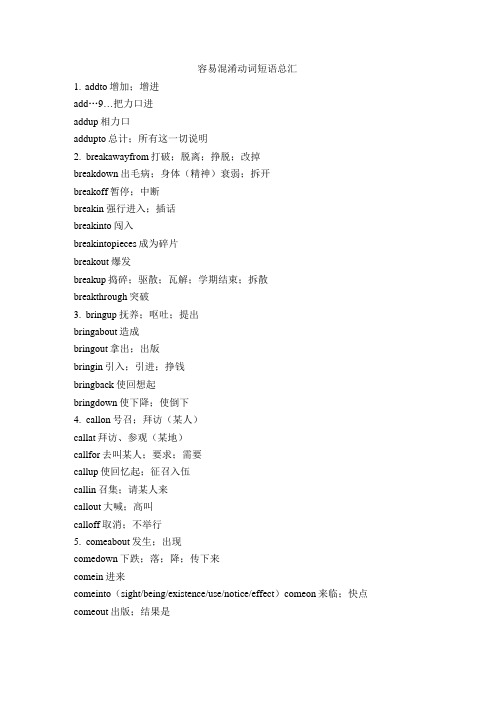
容易混淆动词短语总汇1.addto增加;增进add…9…把力口进addup相力口addupto总计;所有这一切说明2.breakawayfrom打破;脱离;挣脱;改掉breakdown出毛病;身体(精神)衰弱;拆开breakoff暂停;中断breakin强行进入;插话breakinto闯入breakintopieces成为碎片breakout爆发breakup捣碎;驱散;瓦解;学期结束;拆散breakthrough突破3.bringup抚养;呕吐;提出bringabout造成bringout拿出;出版bringin引入;引进;挣钱bringback使回想起bringdown使下降;使倒下4.callon号召;拜访(某人)callat拜访、参观(某地)callfor去叫某人;要求;需要callup使回忆起;征召入伍callin召集;请某人来callout大喊;高叫calloff取消;不举行eabout发生;出现comedown下跌;落;降;传下来comein进来comeinto(sight/being/existence/use/notice/effect)comeon来临;快点comeout出版;结果是comealong一道来;赶快cometo达至U(anend/anagreement/astop)苏醒;合计;总共是comeover走过来comeup发芽;走近comeacross偶然碰到comeback回想起comefrom来自;源自6.cutacross抄近路cutdown砍倒;削减cutoff切断;割掉;断绝关系cutup连根拔除;切碎through剪断;凿穿cutout删(省)掉;戒掉cutin插嘴7.dieof(disease/hunger/grief/oldage)死于(疾病、饥饿、寒冷、情感原因)diefrom死于(意外事故、情形)dieaway渐渐消逝dieout绝种diedown(炉火)渐熄dieoff逐一死去8.fallbehind落后falloverone’sfeet跌跤falldown掉下;跌倒fallback撤退;后退9.goinfor从事;喜爱;参加gothrough通过;经受goover复习;检查goup(价格)上涨;建造起来goafter追捕;追赶goagainst违反goahead先行;开始吧;问吧;说吧goaway离开goby时间过去godown下沉;降低;(日、月)西沉goon(with)继续进行gowith相配;陪同gowithout没有;缺少goout外出;熄灭goallout全力以赴gooff爆炸;进行;变坏;断电;停止供应gobackon背约;食言gobeyond超出10.getdown下来;记下;使沮丧getdownto致力于;专心于geton进展;进步;穿上;上车getoff脱下;下车getin收集;插(话)getaway逃跑;逃脱;去休假getover忘记;越过;克服;从疾病中恢复getalongwith进展;相处getup起床getthrough打通电话;完成;通过getround消息传开getclosetosth.接近;几乎getinto(trouble)陷入(麻烦)getto(know)逐渐(知道)getback取回;收回11.giveaway赠送;泄露;出卖giveout发出;疲劳;分发;公布giveoff发出(光、热、气体)givein(tosb.)屈服giveup放弃;让(座位)12.handin交上;提交handout分发handdown流传;遗传13.hangabout闲逛hangup挂电话14.holdback阻止;隐瞒holdup举起;使停顿holdon别挂电话;等等;坚持holdout持续;坚持;伸出holddown控制;镇压15.keepup(courage,spirits)保持(勇气、精神)keepupwith跟上keepoff(grass)不接近;离开keepawayfrom避开;不接近;离远远的keepoutof不让……进入……keepto(rules,promise)坚持、遵守(规则、诺言)keepon继续;坚持下来keepback阻止;留下;隐瞒;扣下keepfrom克制;阻止16.knockat/on敲knockinto撞到某人身上knockdown撞倒knockoutof把敲出knockover撞倒knockoff停止工作;休息17.leavefor离开前往leaveout删去;遗漏leavebehind遗留;忘记拿走leaveto留给;遗嘱赠于leaveover遗留;剩下;延期18.lookup查找;向上看lookthrough翻阅;浏览lookon旁观lookon…as看作……lookinto调查lookafter/at/for照顾/看/寻找look。
初中英语总复习易混词盘点(最新)
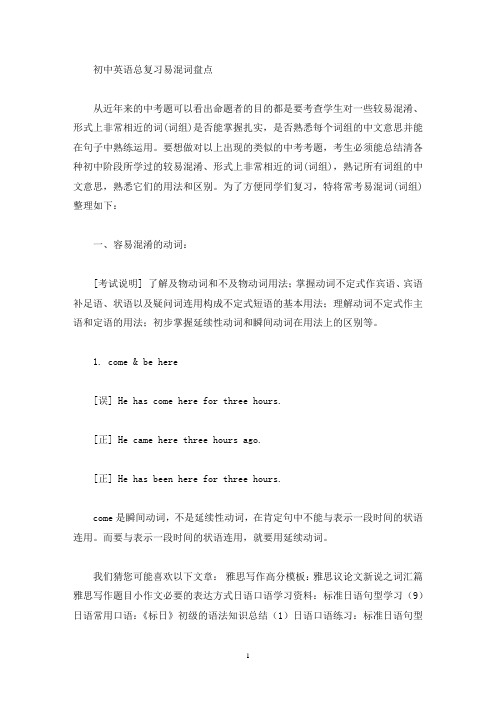
初中英语总复习易混词盘点从近年来的中考题可以看出命题者的目的都是要考查学生对一些较易混淆、形式上非常相近的词(词组)是否能掌握扎实,是否熟悉每个词组的中文意思并能在句子中熟练运用。
要想做对以上出现的类似的中考考题,考生必须能总结清各种初中阶段所学过的较易混淆、形式上非常相近的词(词组),熟记所有词组的中文意思,熟悉它们的用法和区别。
为了方便同学们复习,特将常考易混词(词组)整理如下:一、容易混淆的动词:[考试说明] 了解及物动词和不及物动词用法;掌握动词不定式作宾语、宾语补足语、状语以及疑问词连用构成不定式短语的基本用法;理解动词不定式作主语和定语的用法;初步掌握延续性动词和瞬间动词在用法上的区别等。
1. come & be here[误] He has come here for three hours.[正] He came here three hours ago.[正] He has been here for three hours.come是瞬间动词,不是延续性动词,在肯定句中不能与表示一段时间的状语连用。
而要与表示一段时间的状语连用,就要用延续动词。
我们猜您可能喜欢以下文章:雅思写作高分模板:雅思议论文新说之词汇篇雅思写作题目小作文必要的表达方式日语口语学习资料:标准日语句型学习(9)日语常用口语:《标日》初级的语法知识总结(1)日语口语练习:标准日语句型学习(7)日语口语:服装缝纫专用术语盘点日语口语常用教程:与看电视有关的词汇日语口语教材:标准日语句型学习(6)12年gre词汇表:词根cludgre词汇精选:词根juven 中考英语动态:初中英语总复习易混词盘点与此同类的还有borrow/lend-keep; join-be in/at; die-be dead; buy-have; leave-be away,etc.2. cost & take & spend & pay[误] I cost a lot of time to read stories.[正] It cost me a lot of time to read stories.[正] I spent a lot of time reading stories.cost除了钱的花费以外,还能表示时间上的花费,但常用物做主语。
初中英语常见动词短语集中记
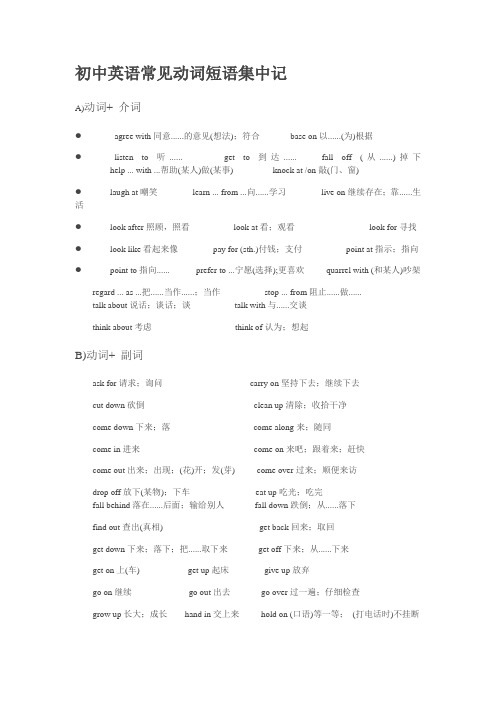
初中英语常见动词短语集中记A)动词+ 介词●agree with同意......的意见(想法);符合base on以......(为)根据●listen to听...... get to到达...... fall off (从......)掉下help ... with ...帮助(某人)做(某事) knock at /on敲(门、窗)●laugh at嘲笑learn ... from ...向......学习live on继续存在;靠......生活●look after照顾,照看look at看;观看look for寻找●look like看起来像pay for (sth.)付钱;支付point at指示;指向●point to指向...... prefer to ...宁愿(选择);更喜欢quarrel with (和某人)吵架regard ... as ...把......当作......;当作stop ... from阻止......做......talk about说话;谈话;谈talk with与......交谈think about考虑think of认为;想起B)动词+ 副词ask for请求;询问carry on坚持下去;继续下去cut down砍倒clean up清除;收拾干净come down下来;落come along来;随同come in进来come on来吧;跟着来;赶快come out出来;出现;(花)开;发(芽) come over过来;顺便来访drop off放下(某物);下车eat up吃光;吃完fall behind落在......后面;输给别人fall down跌倒;从......落下find out查出(真相) get back回来;取回get down下来;落下;把......取下来get off下来;从......下来get on上(车) get up起床give up放弃go on继续go out出去go over过一遍;仔细检查grow up长大;成长hand in交上来hold on (口语)等一等;(打电话时)不挂断hurry up赶快look out留神;注意look over (仔细)检查look up向上看;抬头看pass on传递;转移到...... pick up拾起;捡起put away放好;把......收起来put on穿上;戴上;(戏剧等)上演;放(唱片等) put down把(某物)放下来put up掛起;举起run away流失;逃跑;逃走rush out冲出去set off出发;动身;启程send up发射;把......往上送shut down把......关上sit down坐下slow down减缓;减速take off脱掉(衣服) take out取出throw about乱丢;抛撒trip over (被......)绊倒try on试穿(衣服、鞋等);试戴(帽子等)try out试验;尝试T urn down关小;调低wake up醒来turn on打开(电灯、收音机、煤气、自来水等)turn off关(电灯、收音机、煤气、自来水等) turn over (使)翻过来wear out把......穿旧;磨坏work out算出;制订出write down写下......C) be + 形容词+ 介词be angry with对(某人)发脾气be interested in对......感兴趣be able to能;会be afraid of害怕be amazed at对......感到惊讶be excited about对......感到兴奋be filled with用......充满be full of充满......的be good at (= do well in ) be late for迟到在......方面做得好;善于be made in在......生产或制造be made of由......组成;由......构成be pleased with对......感到满意be proud of以......自豪(高兴)be used for用于D)动词+ 名词/ 代词beg one\'s pardon请原谅;对不起do morning exercises做早操do one\'s homework做作业enjoy oneself (= have a good time)过得快乐;玩得开心give a concert开音乐会go boating去划船go fishing去钓鱼go hiking去徒步旅行go skating去滑冰go shopping (去)买东西have a cold (患)感冒have a cough (患)咳嗽have a headache (患)头痛have a try尝试;努力have a look看一看have a rest休息have a seat (= take a seat ) 就坐;坐下have sports进行体育活动have supper吃晚餐hear of听说hold a sports meeting举行运动会make a decision作出决定make a mistake犯错误make a noise吵闹make faces做鬼脸make friends交朋make money赚钱take one\'s place坐某人的座位;代替某人的职务teach oneself (=learn by oneself ) 自学take photos照相take time花费(时间)take turns轮流watch TV看电视E)动词+ 名词/ 代词/ 副词+ 介词catch up with赶上come up with找到;提出(答案、解决办法等)get on well with与......相处融洽give birth to生(孩子)help yourself / yourselves to自取;随便吃make room for给......腾出地方play a joke on戏弄人;对人恶作剧speak highly of称赞say good bye to告别;告辞take an active part in积极参加take care of照顾;照料;注意F)其他类型be awake醒着的be born出生be busy doing忙着做......come true实现do one\'s best尽最大努力fall asleep睡觉;入睡go home回家go on doing (sth.)继续做某事;尽力get married结婚get together相聚go straight along沿着......一直往前走had better (do)最好(做......) keep doing sth.一直做某事make sure确保;确认;查明make up one\'s mind下决心中考英语give 详解1. give sb sth / give sth to sb 把某物给某人。
初中英语常见易混动词
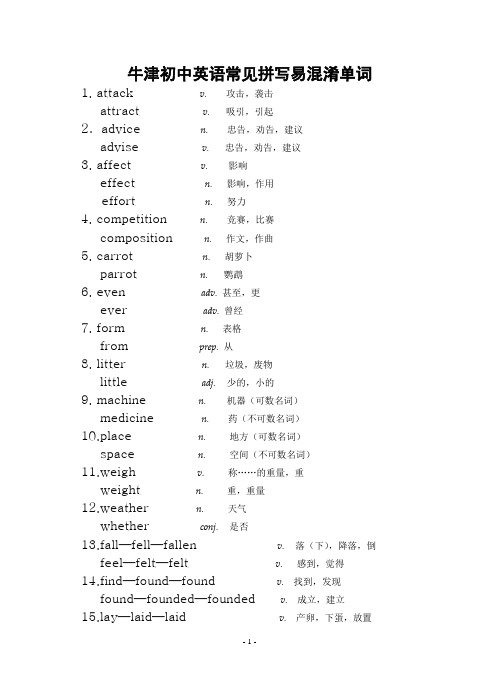
牛津初中英语常见拼写易混淆单词1. attack v. 攻击,袭击attract v.吸引,引起2.advice n.忠告,劝告,建议advise v.忠告,劝告,建议3. affect v.影响effect n.影响,作用effort n.努力4. competition n.竞赛,比赛composition n.作文,作曲5. carrot n. 胡萝卜parrot n.鹦鹉6. even adv.甚至,更ever adv.曾经7. form n.表格from prep.从8. litter n.垃圾,废物little adj.少的,小的9. machine n.机器(可数名词)medicine n. 药(不可数名词)10.place n. 地方(可数名词)space n. 空间(不可数名词)11.weigh v.称……的重量,重weight n. 重,重量12.weather n.天气whether conj.是否13.fall—fell—fallen v.落(下),降落,倒feel—felt—felt v.感到,觉得14.find—found—found v. 找到,发现found—founded—founded v. 成立,建立y—laid—laid v.产卵,下蛋,放置lie—lay—lain v.躺,位于16.collect v.收集,搜集connect v.连接,相连,联系correct v. 改正,纠正adj.正确的,对的17. except prep.除……之外expect v. 期望,预期,预料18.kitchen n.厨房chicken n.鸡, 鸡肉19.idea n. 主意,想法ideal adj.理想的,想象的20.medal n.奖牌(可数名词)metal n.金属(不可数名词)model n. 模型,模特儿(可数名词)21. quiet adj. 安静的,寂静的quite adv.相当,十分22. desert n.沙漠dessert n. 甜点23. tired adj.疲劳的,累的tried (try的过去式)v.试,试图,努力24. breath n. 呼吸breathe v.呼吸25. clean adj.清洁的,干净的v.把……弄干净,擦干净clear adj.清晰的,明亮的,清楚的26. practice n.练习practise(美practice)v.练习27. invent v. 发明,创造(invention n.发明物)invite v.邀请(invitation n.邀请)28. high adj. 高的height n.高,高度29. hard adj. 困难的adv.努力地hardly adv.几乎不30. lovely adj. 可爱的,好看的lively adj.活泼的,生气勃勃的likely adj.可能的31. through prep. 穿过,通过though conj.虽然,尽管thought(think过去式)v.想,认为32. cross v.穿过across prep. 穿过33. image n.图像,形象imagine v. 想象,设想34. region n.地区,行政区religion n. 宗教。
初中易混单词

初中易混单词1. affect/effect- affect是动词,意为"影响"- effect是名词,意为"结果,影响"2. their/there/they're- their是形容词,意为"他们的"- there是副词,意为"那里"- they're是缩写形式,意为"他们是"3. accept/except- accept是动词,意为"接受"- except是介词,意为"除了"4. lose/loose- lose是动词,意为"丢失"- loose是形容词,意为"宽松的"5. to/too/two- to是介词,用于表示目的或方向- too是副词,意为"也,过于"- two是数字,意为"二"6. principal/principle- principal是名词,意为"校长"- principle是名词,意为"原则"7. affectation/affection- affectation是名词,意为"做作,矫揉造作" - affection是名词,意为"感情,喜爱"8. quiet/quite- quiet是形容词,意为"安静的"- quite是副词,意为"相当,完全"9. advice/advise- advice是名词,意为"建议"- advise是动词,意为"建议"10. whose/who's- whose是代词,意为"谁的"- who's是缩写形式,意为"谁是"。
中考易混淆单词词组汇总
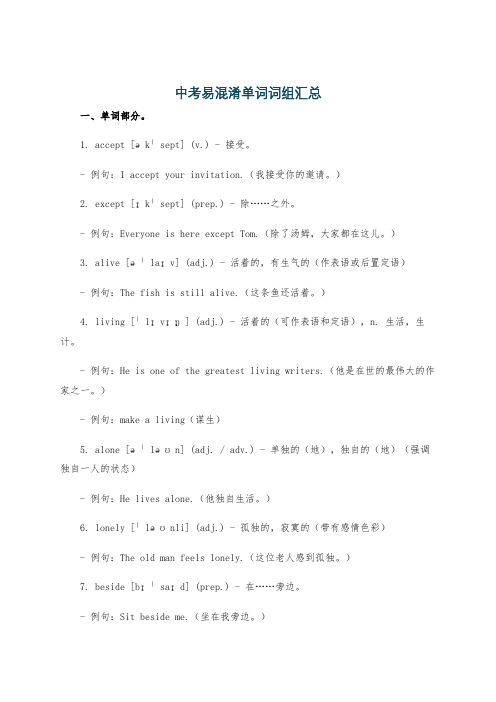
中考易混淆单词词组汇总一、单词部分。
1. accept [əkˈsept] (v.) - 接受。
- 例句:I accept your invitation.(我接受你的邀请。
)2. except [ɪkˈsept] (prep.) - 除……之外。
- 例句:Everyone is here except Tom.(除了汤姆,大家都在这儿。
)3. alive [əˈlaɪv] (adj.) - 活着的,有生气的(作表语或后置定语)- 例句:The fish is still alive.(这条鱼还活着。
)4. living [ˈlɪvɪŋ] (adj.) - 活着的(可作表语和定语),n. 生活,生计。
- 例句:He is one of the greatest living writers.(他是在世的最伟大的作家之一。
)- 例句:make a living(谋生)5. alone [əˈləʊn] (adj. / adv.) - 单独的(地),独自的(地)(强调独自一人的状态)- 例句:He lives alone.(他独自生活。
)6. lonely [ˈləʊnli] (adj.) - 孤独的,寂寞的(带有感情色彩)- 例句:The old man feels lonely.(这位老人感到孤独。
)7. beside [bɪˈsaɪd] (prep.) - 在……旁边。
- 例句:Sit beside me.(坐在我旁边。
)8. besides [bɪˈsaɪdz] (prep. / adv.) - 除……之外(还有),此外。
- 例句:Besides English, we also learn French.(除了英语,我们还学法语。
)- 例句:I don't like this dress. Besides, it's too expensive.(我不喜欢这条裙子。
它太贵了。
中考易混用动词辨析
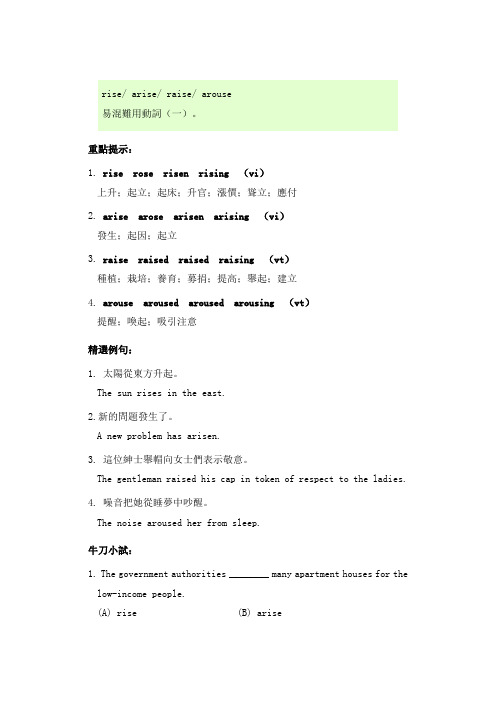
rise/ arise/ raise/ arouse易混難用動詞(一)。
重點提示:1. rise rose risen rising (vi)上升;起立;起床;升官;漲價;聳立;應付2. arise arose arisen arising (vi)發生;起因;起立3. raise raised raised raising (vt)種植;栽培;養育;募捐;提高;舉起;建立4. arouse aroused aroused arousing (vt)提醒;喚起;吸引注意精選例句:1. 太陽從東方升起。
The sun rises in the east.2.新的問題發生了。
A new problem has arisen.3. 這位紳士舉帽向女士們表示敬意。
The gentleman raised his cap in token of respect to the ladies.4. 噪音把她從睡夢中吵醒。
The noise aroused her from sleep.牛刀小試:1. The government authorities ________ many apartment houses for the low-income people.(A) rise (B) arise(C) raise (D) arouse2. The accident on the freeway ________ from careless driving.(A) rose (B) arose(C) raised (D) aroused3. Her pretty attire ________ all the boys.(A) rose (B) arose(C) raised (D) aroused4. The children ________ from their seats to salute the national flag.(A) rose (B) arisen(C) raised (D) aroused5. My suspicion ________ owing to his refusing to tell me the truth.(A) rose (B) arose(C) raised (D) arousedlie /lay易混難用動詞(二)。
初中英语常见动词及动词词组
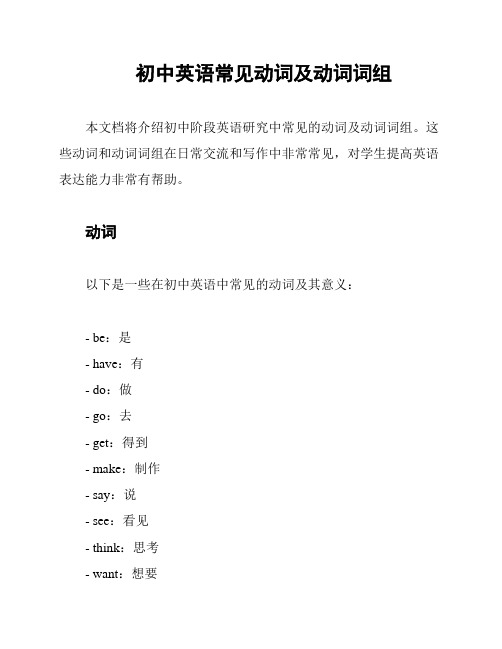
初中英语常见动词及动词词组
本文档将介绍初中阶段英语研究中常见的动词及动词词组。
这些动词和动词词组在日常交流和写作中非常常见,对学生提高英语表达能力非常有帮助。
动词
以下是一些在初中英语中常见的动词及其意义:
- be:是
- have:有
- do:做
- go:去
- get:得到
- make:制作
- say:说
- see:看见
- think:思考
- want:想要
- like:喜欢- love:爱
- enjoy:享受- study:研究- play:玩耍- eat:吃
- drink:喝
- wear:穿戴- sleep:睡觉- run:跑
- walk:走
- listen:听- speak:说话- read:阅读- write:写
- draw:画图- sing:唱歌- dance:跳舞
动词词组
以下是一些常用的初中英语动词词组:
- go to school:去上学
- get up:起床
- go to bed:去睡觉
- have breakfast:吃早餐
- have lunch:吃午餐
- have dinner:吃晚餐
- do homework:做作业
- play sports:进行体育运动
- watch TV:看电视
- listen to music:听音乐
- speak English:说英语
- read books:读书
- write essays:写作文
希望以上内容对您的英语学习有所帮助。
加油!。
初中必须掌握的英语动词词组
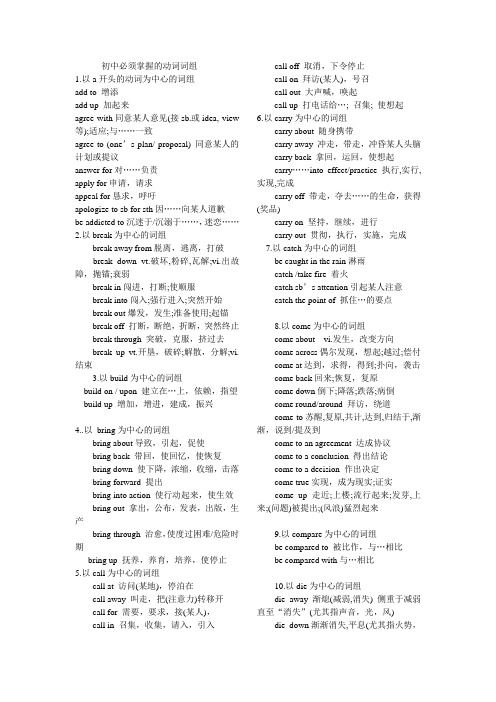
初中必须掌握的动词词组1.以a开头的动词为中心的词组add to 增添add up 加起来agree with同意某人意见(接sb.或idea, view 等);适应;与……一致agree to (one’s plan/ proposal) 同意某人的计划或提议answer for对……负责apply for申请,请求appeal for恳求,呼吁apologize to sb for sth因……向某人道歉be addicted to沉迷于/沉溺于……,迷恋……2.以break为中心的词组break away from脱离,逃离,打破break down vt.破坏,粉碎,瓦解;vi.出故障,抛锚;衰弱break in闯进,打断;使顺服break into闯入;强行进入;突然开始break out爆发,发生;准备使用;起锚break off 打断,断绝,折断,突然终止break through 突破,克服,挤过去break up vt.开垦,破碎;解散,分解;vi.结束3.以build为中心的词组build on / upon 建立在…上,依赖,指望build up 增加,增进,建成,振兴4..以bring为中心的词组bring about导致,引起,促使bring back 带回,使回忆,使恢复bring down 使下降,浓缩,收缩,击落bring forward 提出bring into action 使行动起来,使生效bring out 拿出,公布,发表,出版,生产bring through 治愈,使度过困难/危险时期bring up 抚养,养育,培养,使停止5.以call为中心的词组call at 访问(某地),停泊在call away 叫走,把(注意力)转移开call for 需要,要求,接(某人),call in 召集,收集,请入,引入call off 取消,下令停止call on 拜访(某人),号召call out 大声喊,唤起call up 打电话给…; 召集; 使想起6.以carry为中心的词组carry about 随身携带carry away 冲走,带走,冲昏某人头脑carry back 拿回,运回,使想起carry……into effect/practice 执行,实行,实现,完成carry off 带走,夺去……的生命,获得(奖品)carry on 坚持,继续,进行carry out 贯彻,执行,实施,完成7.以catch为中心的词组be caught in the rain淋雨catch /take fire 着火catch sb’s attention引起某人注意catch the point of 抓住…的要点8.以come为中心的词组come about vi.发生,改变方向come across偶尔发现,想起;越过;偿付come at达到,求得,得到;扑向,袭击come back回来;恢复,复原come down倒下;降落;跌落;病倒come round/around 拜访,绕道come to苏醒,复原,共计,达到,归结于,渐渐,说到/提及到come to an agreement 达成协议come to a conclusion 得出结论come to a decision 作出决定come true实现,成为现实;证实come up走近;上楼;流行起来;发芽,上来;(问题)被提出;(风浪)猛烈起来9.以compare为中心的词组be compared to 被比作,与…相比be compared with与…相比10.以die为中心的词组die away渐熄(减弱,消失) 侧重于减弱直至“消失”(尤其指声音,光,风)die down渐渐消失,平息(尤其指火势,大海,脾气)die of 死于(疾病、饥饿、寒冷、情感等内因)die from 死于(灾害、事故等外因)die off死去die out 灭绝,消失,熄灭11.以do为中心的词组do a good deed做一件好事do the deed 付诸行动,生效do away with去掉,废除;弄死;浪费do good to (=do sb. good)有益于do harm to (=do sb. harm)有害于do without不需要…也行,不用12.以fall为中心的词组fall ill /asleep /silent 生病/睡着/沉默fall back撤退,后退fall behind 落后,落伍,落在后面fall down 倒下,落下,掉下,病倒,失败fall in love with…爱上(某人)fall into a habit of 养成…习惯fall off 掉下,衰退,减少13.以get为中心的词组get about徘徊,走动,旅行;流传get across度过,通过,横过;说服,使被理解get ahead of胜过,超过get along前进,进步;同意;离去,相处get along with与……相处get around 走动,传播,影响,说服get away离开,逃脱,出发,开始度假get back取回,回来;报复get close to 接近,靠近get in touch with…与…取得联系get into/out of debt 欠债/不欠债get off送走;脱下(衣服);下车;动身get over越过;恢复,痊愈;克服;完成get rid of除去,去掉;免除,摆脱get through拨通,到达,恢复,通过;及格get together 积聚,积累;商谈,取得一致意见14.以give为中心的词组give away赠送;牺牲;泄露;颁发give back归还,反射give in屈服,让步,投降give off发出(烟,气味)give out vt.分发,公布,发出,使筋疲力尽vi.用完give rise to引起,导致;使~~发生give up放弃;停止give way to让步,退却;屈服于15.以go为中心的词组go about走来走去,(谣言等)流传go across 度过,越过go after 追逐,追求,跟随go against 反对,不利于go ahead 前进,进展,继续go all about 鼓足干劲,全力以赴go along with…陪伴,和…一道走go back to 追溯至go bad 变坏,腐败go beyond 超过,胜过go by 经过,过去go down 下降,沉没,垮台,(风等)平静go for 支持,赞成,适用于,去(取,拿)go in for 喜欢,参加,赞成,从事, 为…而努力go into 进入,参加,调查,从事,深入研究go on 继续,接下去go on with…继续做,忍受go out 出去,熄灭,离开,下台,退休go over 温习,检查,越过go through 审查,履行,通过,经历,忍受go up 上升,上涨,攀登go without 无需,没有…也行go wrong 出故障,走错路16.以hold为中心的词组hold back 隐瞒,阻止,克制,扣留hold to / by 坚持,固守hold down 压制,压低,缩减hold off 耽搁,不接近,离开hold out 伸出,提出,支持,主张hold up 举起,竖起,支持,使停滞hold with 和…意见一致,赞成17.以keep为中心的词组keep away (from) 不接近,避开,远离keep back 阻止,扣留,隐瞒keep company with…和…结交keep …from…阻止keep in mind 记住keep in touch with…与…保持联系/不断接触keep off 不接近,远离keep on doing 继续,不停地做keep one’s balance 保持平衡keep out 使…不入内keep pace with…跟上,同…步调一致keep up 继续,坚持,保持,维持keep up with…赶上,跟上,与…并肩前进18.以leave为中心的词组leave about乱放,乱丢leave alone 听任,任其自然leave…as it is.听其自然leave behind 留下,忘记携带leave for (离开某地)去某地leave out 省去,遗漏,不把…计算在内leave off 停止,脱去,戒除leave office 离职,下台leave over 留下,剩下,延期leave school 毕业leave sth, to / with sb把…交给/留给某人.leave sb, sth. 把…交给/留给某人leave word / a message 留言,留信19.以look为中心的词组look about四下环顾;查看look after照顾,看管look around东张西望look back on / upon …回顾look down on /upon俯视;轻视look forward to盼望,期待look into窥视;调查;浏览look on…as…把…看作look out向外看;注意;当心,提防look over从上面看过去;检查,忽略look through透过……看去;看穿;浏览,彻底调查look to 面向,注意look up 查阅,仰视,涨价look up to仰望,尊敬20.以make为中心的词组be made from由……原料制成be made (out) of由……材料制成be made up of由……组成make an appointment with sb.与…约定make a difference 有差别,有关系,很重要make a fool of愚弄,欺骗make a point 阐述观点make a point of doing强调;决心,坚持make a will 立下遗嘱make advantages/use of使用,利用make believe假装make certain / sure确信,把……弄清楚make contact with 接通,与……接触,与……联系make for去向,向……前进;有利于make oneself at home随便,别拘束make oneself understood 让别人理解自己make out填写;开支票;理解;辨认make preparations for为…作准备make the best/ most of尽量利用;极为重视make up弥补,修理,赔偿,起草,编造,化装,配制,占…比例make up to 接近,巴结;向……求爱21.以meet为中心的词组meet the need/demand/requirement of满足…需要meet with 偶然碰见,遭受,22.以pass为中心的词组pass away 去世,(时间)过去pass by 经过,(时间)过去pass on/upon 传递,通过pass out of one’s mind 被人忘掉pass over 忽视,置之不理pass through 经历,经过,贯穿23.以put为中心的词组put aside 把……放在一边;搁置;排除put away 把……放好,把……收拾;储藏;put back 把……放回原处;拨回put down 放下;镇压;记下;削减;降落put an end to 结束,终止,废除put forward 提出;拨快;建议,推荐;提倡,put in 驶入,进入put…(down) in writing 把…写下来put ……into把……放入;插入;翻译成put…into use应用put…into practice把…付诸于实践put…into action把…付诸于实践,实施,使生效put…into effect把..付诸于实践,实施,使生效put…into operation 将…投入生产,实施,开动put…into production将…投产,开始生产put off 推迟,延期;消除;推脱,脱下put on上演,穿上,戴上,增加,拨快(钟表),推荐put one’s heart into 全神贯注,专心致志put out 熄灭,伸出,拿出,制造,刺杀put through 完成,(电话用语)拨通,使穿过put up 举起,挂起;提名,推荐;陈列put up with 忍受,容忍24.以see为中心的词组see into 识透,调查see out 送某人到门口/屋外,see off送行see through 看透,识破,支持(某人)到底25.以send为中心的词组send away 解雇,赶走,把…送往远处send down 把…向下发送,开除,降低(价格,温度)send for 派人去叫/请/拿send off 发出,寄出,解雇,送别send out 发出,散发,长出(树叶等)send up 发射,使上升,向上传递26.以set为中心的词组set about(doing)着手,开始set an example to sb.给某人树立个榜样set aside 取消,放在一边,放弃,忽视,拒绝set back 把(钟表)往回拨set down 放下,卸下,登记,记载set fire to (= set…on fire) 放火烧毁set free 释放(某人)set off vi.出发vt.使爆炸,拨出(钱等)set out vi.出发vt.开始,着手(to do),布置set up 建立,设立,开办,引起(疾病等)27.以take为中心的词组take a chance / an opportunity碰运气,抓机会take a seat就坐take a shower淋浴,洗澡take advantage of 利用,乘…之便take after 仿效,与…相似,长得像take away拿走,减去;夺去take back收回,取消take ……by surprise出奇制胜,突袭take sb.by surprise 使惊讶take care to do 务必做,留心做take ……for/as…把……当作take charge of负责,主管take down 取下,记下,占领,拆毁,take effect 生效,起作用take …for example 以…为例take …for granted 认为…理所当然take in 吸收,接纳,欺骗,轻信,领会take…into account / consideration 考虑,重视take it easy 别紧张,从容take measures 采取措施take off vt.脱去,除去;vi.起飞,起程,成功,成名take office就职,上任take on 呈现,雇佣,承担,担任take one’s place就坐,入坐,代替take out 拿出,取出,去除,取得take over 接管,接任,接收take possession of 占有,拥有take the place of代替take turns(to do) 轮流做take up for 袒护take up with 致力于,忍受,对…发生兴趣28.以think为中心的词组think about 考虑think aloud 自言自语think highly / well/much/a lot of对…评价很高think little/ill/nothing of 轻视,看不起think of 想,想着,想做think of …as…把…看作think out 仔细考虑,想通think over仔细考虑think through想通think to oneself 沉思,暗自想think up 想出,想通,想起29.以turn为中心的词组turn away把……打发走,解雇,转脸不采,使转变方向turn a blind eye to对……视而不见turn a deaf to对……充耳不闻turn against背叛,采取敌对态度turn back 折回,往回走turn down 折叠,翻下,驳回,拒绝考虑turn into 走进;变成,变为turn to ……for help 求助于turn off 关上,解雇,避开(问题)turn on 打开;依靠,依赖,取决于turn one’s attention to把注意力转向turn out 培养;证明是;制成;实际情况是turn out to be 原来是,证明是,结果是turn over a new leaf翻开新的一页, 改过自新turn (a)round 旋转,转过身来;改变意见;turn to 变成;着手于。
初中易考知识点常用动词和短语
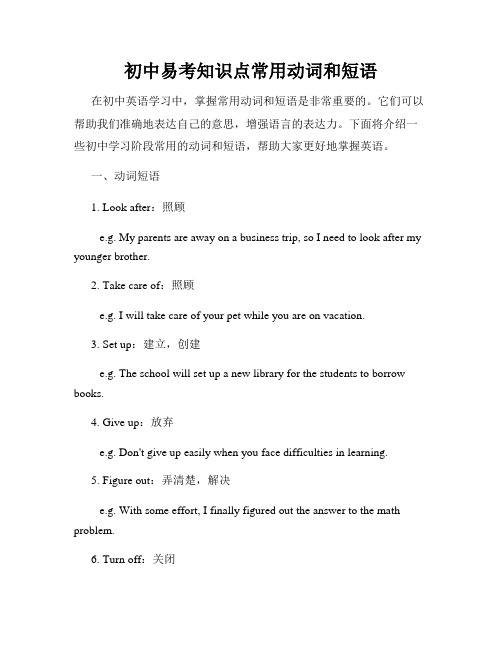
初中易考知识点常用动词和短语在初中英语学习中,掌握常用动词和短语是非常重要的。
它们可以帮助我们准确地表达自己的意思,增强语言的表达力。
下面将介绍一些初中学习阶段常用的动词和短语,帮助大家更好地掌握英语。
一、动词短语1. Look after:照顾e.g. My parents are away on a business trip, so I need to look after my younger brother.2. Take care of:照顾e.g. I will take care of your pet while you are on vacation.3. Set up:建立,创建e.g. The school will set up a new library for the students to borrow books.4. Give up:放弃e.g. Don't give up easily when you face difficulties in learning.5. Figure out:弄清楚,解决e.g. With some effort, I finally figured out the answer to the math problem.6. Turn off:关闭e.g. Remember to turn off the lights when you leave the room.7. Pick up:拾起,接e.g. Can you pick up my pen from the floor?8. Hand in:交上e.g. Please make sure you hand in your homework on time.9. Settle down:安定下来e.g. After moving to a new city, it took me some time to settle down.10. Carry out:执行,实施e.g. The teacher asked the students to carry out the experiment according to the instructions.11. Make up:编造,弥补e.g. He made up an excuse for being late to school.12. Cheer up:振作起来e.g. Don't be upset. Cheer up and face your problems.二、常用动词1. Be:是,存在e.g. I am a student.2. Have:有,拥有e.g. She has a beautiful voice.3. Do:做,干e.g. I often do my homework in the evening.4. Go:去e.g. They go to school by bus.5. Get:得到,获得e.g. He got a high score on the test.6. Make:制作,做e.g. My mother makes delicious cakes.7. Take:拿,带e.g. Please take your umbrella with you when it's raining.8. Give:给予e.g. Can you give me a pen, please?9. See:看到,见到e.g. I saw my friend at the park yesterday.10. Use:使用e.g. You can use a calculator to solve the math problem.11. Know:知道e.g. I don't know the answer to this question.12. Learn:学习e.g. She learns English every day.总结:通过掌握这些常用的动词和短语,同学们可以更加流利地表达自己的意思,让自己的英语交流更加准确、清晰。
17 组(近100个词汇)易混动词辨析与练习(无答案)

17 组(近100个词汇)易混动词辨析与练习一Speak/talk/say/tell辨析:1 say 一般做及物动词,着重于说话的内容。
它的宾语可以是名词或直接引语,间接引语等。
2 speak 这个词着重说的动作,不强调所说的内容。
做及物动词使用时,常以某种语言为宾语。
作不及物动词时,常见的搭配形式有:speak of sb or sth speak to sb speak with sb 等。
3 talk 一般做不及物动词,意为“交谈,谈话”,着重强调两个人之间的相互谈话。
常见的搭配形式有:talk to or with sb talk about sb or sth 等。
4 tell 常做及物动词,意思为“讲述,告诉”。
常接双宾语(将某事告诉某人)。
常见的搭配形式有:tell sb about sth or sb tell...from... tell a lie等。
练习:用say,speak,talk或tell的适当形式填空:1 Can you _____Chinese now?2 Sometimes he_____in class.3 Tom_____something important at yesterday's meeting.4 He______at yesterday's meeting.5 Can you_____me something about your country?6 I'm sorry.I can't______yes or no from them.二spend/pay/cost/take辨析:1 spend意为“花费”。
其主语常是人。
常见的搭配形式有:sb spend(s) some money on sth(其中in可省略)2 cost 意为:“花费,耗费”。
其主语必须是物或事。
其句型是sth cost sb some money 等。
易混动词和动词短语
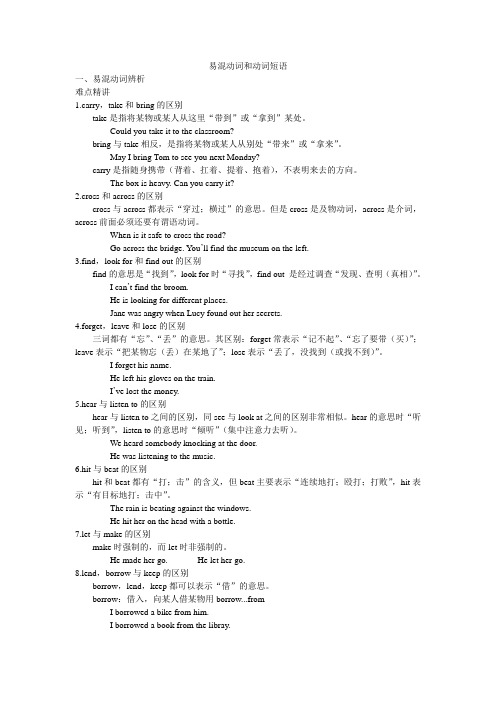
易混动词和动词短语一、易混动词辨析难点精讲1.carry,take和bring的区别take是指将某物或某人从这里“带到”或“拿到”某处。
Could you take it to the classroom?bring与take相反,是指将某物或某人从别处“带来”或“拿来”。
May I bring Tom to see you next Monday?carry是指随身携带(背着、扛着、提着、抱着),不表明来去的方向。
The box is heavy. Can you carry it?2.cross和across的区别cross与across都表示“穿过;横过”的意思。
但是cross是及物动词,across是介词,across前面必须还要有谓语动词。
When is it safe to cross the road?Go across the bridge. You’ll find the museum on the left.3.find,look for和find out的区别find的意思是“找到”,look for时“寻找”,find out 是经过调查“发现、查明(真相)”。
I can’t find the broom.He is looking for different places.Jane was angry when Lucy found out her secrets.4.forget,leave和lose的区别三词都有“忘”、“丢”的意思。
其区别:forget常表示“记不起”、“忘了要带(买)”;leave表示“把某物忘(丢)在某地了”;lose表示“丢了,没找到(或找不到)”。
I forget his name.He left his gloves on the train.I’ve lost the money.5.hear与listen to的区别hear与listen to之间的区别,同see与look at之间的区别非常相似。
初二英语易混动词短语
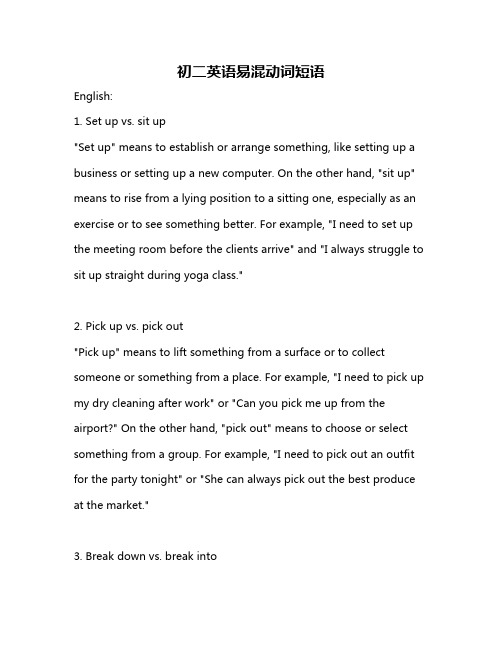
初二英语易混动词短语English:1. Set up vs. sit up"Set up" means to establish or arrange something, like setting up a business or setting up a new computer. On the other hand, "sit up" means to rise from a lying position to a sitting one, especially as an exercise or to see something better. For example, "I need to set up the meeting room before the clients arrive" and "I always struggle to sit up straight during yoga class."2. Pick up vs. pick out"Pick up" means to lift something from a surface or to collect someone or something from a place. For example, "I need to pick up my dry cleaning after work" or "Can you pick me up from the airport?" On the other hand, "pick out" means to choose or select something from a group. For example, "I need to pick out an outfit for the party tonight" or "She can always pick out the best produce at the market."3. Break down vs. break into"Break down" means to stop working, to fail, or to separate something into smaller parts. For example, "My car broke down onthe way to work" or "Can you break down the project into smaller tasks for us?" On the other hand, "break into" means to forcibly enter a building or vehicle, especially in order to steal something. For example, "Someone broke into the store last night and stole some cash" or "I heard that there have been a few break-ins in the neighborhood recently."中文翻译:1. "Set up" 意味着建立或安排某事物,如建立一家企业或安装一个新的电脑。
- 1、下载文档前请自行甄别文档内容的完整性,平台不提供额外的编辑、内容补充、找答案等附加服务。
- 2、"仅部分预览"的文档,不可在线预览部分如存在完整性等问题,可反馈申请退款(可完整预览的文档不适用该条件!)。
- 3、如文档侵犯您的权益,请联系客服反馈,我们会尽快为您处理(人工客服工作时间:9:00-18:30)。
易混动词及词组1.accept 和receive 均可表示“接受”,但是用法不同。
(1)accept “接受”指当事人的态度,同意或不同意采纳He asked Lucy to marry him and she accepted his proposal.(2)receive “接到”指客观事实,不含是否愿意接受的意思She received an invitation but couldn’t accept it.2.add to, add...to... 和add up to 均可表示“加,添”,但用法不同。
(1)add to = increase “增加,增添”add在此处为不及物动词,to 是介词,一起构成短语动词,作及物动词用,主语通常是物。
The bad weather only added to our difficulties.(2)add...to... “把......加到......上”主语通常是人,可用于主动语态和被动语态。
Will you please add a few notes to the essay?(请你给这篇散文加一些注释好吗?)(3)add up to “总计,共达”These numbers add up to 100.3.arrive, get和reach 均可表示“到达”,但用法不同。
(1)arrive 是不及物动词,常见用法A: “ arrive in +大地点” B: “arrive at +小地点”When will you arrive in Shanghai ?We arrived at the restaurant at six in the evening.(2)get 是不及物动词,常见用法“ get to +地点名词”How do you usually get to school every day?(3)reach 是及物动词,后面直接跟地点名词。
When she reached the office, the secretary gave her an urgent letter from America at once.4.borrow, lend 和keep 均可表示“借”,但用法不同。
(1)borrow “借”,是终止性动词,表示主语“借入”某物如borrow sth from sb 表示“从某人处借了某物”I borrowed a novel from the school library.(2)lend “借给”是终止性动词,表示主语“借出”某物如lend sb. sth或lend sth to sb 均表示“把某物借给了某人”Could you lend me a bike?(3)keep “保存,借”是持续动词,表示“借入之后长时间地保留某物”如keep sth for +时间表示“已经借了多长时间”How long can i keep the book?5.care about 和care for 均含care,但用法不同(1)care about “在乎,在意”常用于否定句,指主语无所谓的态度He didn’t care about anything people might say.(2)care for “照料,尊重,喜欢”The little boy is well cared for in the nursery.6.look, see, watch 和read 均可表示“看”,但用法不同(1)look “看”表示动作,是不及物动词,后面需要加介词at 才能跟宾语。
Look!There is a plan in the sky.Look at the picture carefully.(2)see “看见”强调看到的结果,后面可直接跟宾语I can see the girl who is hiding behind the table.(3)watch “观看”尤指观看比赛,电视等It’s not good for children to watch TV for a long time.(4)read “读,看(书,报),表示阅读,后面可直接跟宾语。
Don’t read books in the sun. It will hurt your eyes.7.listen to 与hear 均可表示“听”,但用法不同(1)listen 是不及物动词,与to 构成固定搭配,listen to “听.......”, 强调听的动作Listen!What’s that noise?He likes listening to music.(2)hear “听到”,强调听到的结果She heard footsteps behind her.8.say, speak, talk和tell 均可表示“说”,但用法不同(1)say “说”,作为及物动词使用,其后常跟直接引语和间接引语He said he would come tonight.“Good night,” she said.(2)speak “讲话”,一般作为不及物动词使用,有时作为及物动词speak+各种语言May i speak to John, please?Do you speak English?(3)talk “谈话”,是不及物动词,talk about 表示“谈论关于......”talk to/with 表示“和......讲话”Mr. Thompson is talking with my father in the office now, please wait here for a moment.What are you talking about?(4)tell “告诉,讲述”,是及物动词,可带双宾语和复合宾语,常用结构,tell sb sth/that 从句;tell sb to do sth.The teacher told us an interesting story yesterday.She told us that we would have an English exam the next week.9.bring,take,fetch和carry 均可表示“拿,取”,但用法不同。
(1)bring “带来,拿来”只把某物和某人从另一个地方带到说话的地方来,或者可以说是由远及近Bring me you dictionary tomorrow.(2)take “带走”指把某物或某人从说话的地方带到另一个地方去,也可以说是“由近及远”,常和介词to 搭配Can you help me take the book to the classroom?(3)carry “提,扛,搬,携带”意思较多,没有方向性He is carrying water.(4)fetch “去拿,去取”,表示往返取物She went to fetch the kids.10.look for, search for和find均可表示“寻找”,但用法不同。
(1)look for “寻找”强调寻找的过程。
I am looking for the key. Do you see it?(2)search for “寻找,搜寻”其对象多是一个或一批人或物,如找矿,找资料,找文件,找工作等。
它强调寻找的行为,不着重结果。
They are searching for the missing child.(3)find “找到”强调寻找的结果。
Can you find my shoes?11.cost, pay,spend,和take 均可表示“花费”,但用法不同(1)cost “花费(时间或金钱)”,后面直接跟时间和金钱,但主语是物The book cost me 120 yuan.(2)pay “支付”词组“pay+金钱+for sth ”表示“为某物花了多少钱”,主语是人I paid 25 dollars for the dress.(3)spend “花费(时间和金钱)”常用结构“spend+时间或金钱+on sth或spend +时间或金钱+(in)doing sth”主语是人Mary spent 1,000dollars on the trip to the beach.She spent an hour dressing up her little sister.(4)take “花费(时间或金钱) 固定结构:It takes(各种时态)+sb+时间或金钱+to do sth It took me half a day to get there.12.dress, put on,wear和in 均可表示“穿”,但用法不同(1)dress常见用法有:dress sb 和dress sb up。
dress sb “给某人穿衣服”dress sb up “打扮某人”The boy dress himself quickly.My mother is dressing up my brother and they are going to a party.(2)put on “穿上,戴上”,表示动作After putting on his coat,Jim went out to play with his classmates.(3)wear “穿着,戴着”表示状态Bob is wearing a red shirt today.(4)in 表示穿着后面加衣服的颜色The man in a black shirt is my father.13.fail和lose 均可表示“失败”,但用法不同。
(1)fail “失败”可作不及物动词,常见用法:fail to do sth,表示“做某事失败,没能做成某事”Jimmy failed to pass the exam.(2)lose “输”后面可直接借比赛,战斗等,表示输掉比赛或战斗,也可用于lose to sb,表示输给某人I’am so sorry that you lose the game.14.beat和win 均可表示“打败”,但用法不同(1)beat “打败”常见用法: beat+某人或某支队伍,表示“打败某人或某队”Look! They are fighting. I think Tom will Li Lei but before that happens, stop them.(3)win “赢得”,如是赢得荣誉,比赛,地位等,表示某人经过努力和全力拼搏胜过其他人,不一定有正面对抗。
